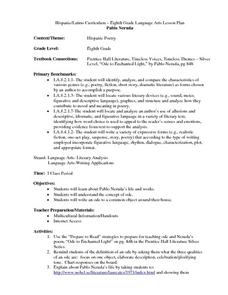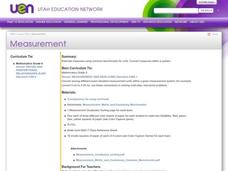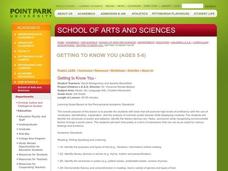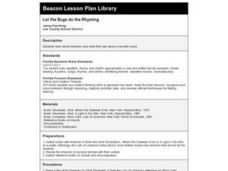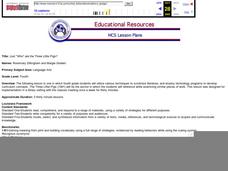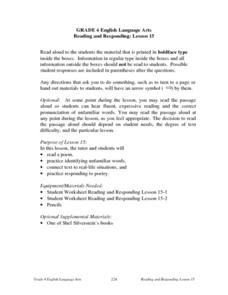Curated OER
Identifying and Describing Story Elements
First graders examine how to identify the different elements of a story and how they fit in a definite sequence. The use of comprehension skills is essential to retell the story as desired within the lesson.
Curated OER
The Odyssey Plan
Ninth graders read and analyze The Odyssey. They apply note-taking skills to identify enemy, type of enemy, and traits demonstrated throughout the book. Students create a storyboard that illustrates the selected episode from the book...
Curated OER
The Emperor and the Kite
Fourth graders explore storytelling by reading a classic story. In this vocabulary identification lesson, 4th graders read the story The Emperor and the Kite and define the different vocabulary terms that appear in the story. Students...
Curated OER
Pablo Neruda
Eighth graders explore the life and works of Pablo Neruda. They complete an author map concerning his personal and professional life. Students identify the key components of an ode. They write an ode to a common object around their...
Curated OER
What's In A Name
Second graders read Chrysanthemum by Kevin Henkes. They then discuss where various names come from. They create a individualized biopoem and publish it on word processing software. Their poems are compiled into a class book and presented...
Curated OER
Song Writing
In this music instructional activity, students identify specific tips for composing a song. They use strophic form where each verse has the same melody. Students also select a chord sequence and use cadences at the end of each phrase and...
Teacher Web
Poetic Sound Devices
As part of a study of poetic devices, kids are asked to identify the assonance, consonance, and alliteration found in a series of lines of poetry, and then identify the rhyme scheme and the types of rhyme found in Poe's "Annabel Lee,"...
Curated OER
Rewriting Shakespeare
Have your learners play around with Shakespeare's language. For this plan, small groups examine and rearrange soliloquies from Othello, noting how the language changes and morphs. All groups have a chance to change each soliloquy, making...
Curated OER
Figurative Language: Simile and Metaphor
What is figurative language? Introduce your young learners to the most popular forms of figurative language: the simile and the metaphor. Start by reading "Willow and Ginkgo" by Eve Merriam, and identify where similes are used. Then look...
Curated OER
Clash of Cultures: Comparing the 1920s and 1960s
Students identify the social, culturaland political problems of the 1920s and compare them to the problems of the 1960s. They research both eras and then make a presentation to the rest of the class.
Curated OER
Measurement
Students explore the concept of measurement. In this measurement lesson, students discuss what specific measurement tools such as an odometer measure. Students recite a measurement poem. Students make a foldable with conversion units...
Curated OER
Getting to Know You
Third graders explore different types of poetry and illustrate their own experiences through creating their own poem. In this getting to know you instructional activity, 3rd graders create and recite their poems with a self-portrait.
Curated OER
Hearts and Partners
Tenth graders explore, examine and study poetry within a variety of different strategies within this instructional activity. They review and discuss a diagram of the big picture of why it's importance to study, analyze and deconstruct...
Curated OER
Let the Bugs do the Rhyming
Students listen to limericks and write their own about a favorite insect.
Curated OER
Haiku - Poetry of the Samurai Warrior
Students research the Samurai and their Haiku Writings. Students use internet research to gather information about the ancient Japanese Samurai. The students then create individual Haiku writings, and a cultural day is designated when...
Curated OER
Poetry for Kids
Sixth graders be immersed indirect experiences which are opportunities for students to reflect, look back, debrief or abstract from their experiences what they have felt, and thought, and studied.
Curated OER
Just "Who" are the Three Little Pigs?
Fourth graders use a Venn diagram to compare and contrast various versions of the story The Three Little Pigs. They write a Cinquain, and then act out their version of the Three Little Pigs in a skit.
Curated OER
Japanese Culture
First graders research information about Japanese people and culture. They read a Japanese story listening for rhyme schemes. They create their own rhyme schemes. They discuss Japanese food and sample rice cakes. They read Haiku and then...
Novelinks
Words by Heart: Question Answer Relationship
Even though readers investigate matters of the heart, this activity promotes the inner workings of learners' brains. The fifth lesson of six has the teacher first model the strategy to the class before having small groups practice. To...
Curated OER
Rockin' and Rollin'
Seventh graders, in groups, describe the three major types of rocks through either a song, skit, poem, etc. They present their work to the class during a "rock concert."
Curated OER
Reading and Responding -- Lesson 15
Fourth graders work independently or in a small group to (1) read a poem, (2) identify unfamiliar words, (3) connect text to real-life situations, and (4) respond to poetry. Reading passage, comprehension questions, and teacher script...
Curated OER
Similes, Metaphors, and Symbols
Here is an outline of a instructional activity in which learners examine the use of similes, metaphors, and symbols in poetry. They define similes, metaphors, and symbols, complete a handout, and create a poem using types of figurative...
Curated OER
Language Arts: Stylistic Devices
Students are able to define given literary terms, such as metaphor, simile, imagery, personification, symbolism, etc. They are able to identify the use of literary elements in a given text. Students are able to interpret weather...
Curated OER
Genre Study - Grade Three
Third graders learn to identify different types of literature genres. For this genre lesson, 3rd graders complete pre and post- assessment, conduct a genre research activity, and complete the associated worksheets.





